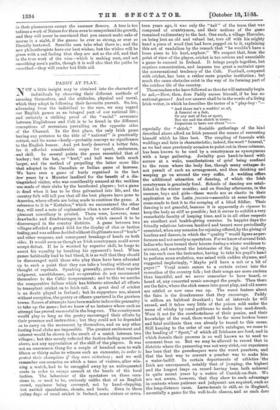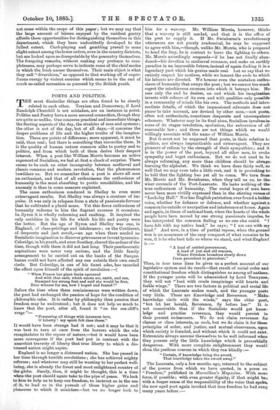PADDY AT PLAY.
NOT a little insight may be obtained into the character of individuals by observing their different methods of
amusing themselves, and the attitudes, physical and moral, which they adopt in following their favourite pursuit. So, too, advancing from the individual to the race, we may regard our English games as an integral part of our national life ; and certainly a striking proof of the " racial " severance between Englishman and Celt is to be found in the different conceptions of recreation prevailing on the opposite sides of the Channel. In the first place, the only Irish game having any pretence to the title of "national" is practically -extinct, and its name—hurly—probably conveys no significance to the English hearer. And yet hnrly deserved a better fate, for it afforded considerable scope for speed, endurance, and skill. In several points the game resembled that of hockey ; but the bat, or "hurl," and ball were both much • larger, and the method of propelling the latter more like that adopted in the Canadian or Indian game of lacrosse. We have seen a game of burly organised in the last few years by a Munster landlord for the henefit of a dis- tinguished visitor, who was considerably amazed at the reckless use .made of their clubs by the barefooted players ; but a game is dead when it has to be thus galvanised into life, and the country folk will tell you that all the best players have gone to America, where efforts are being made to continue the game. A reference to it in " Kottabos," which we encountered the other day, will need a note of explanation when a new edition of that 'pleasant miscellany is printed. There were, however, some drawbacks and disadvantages in burly which caused it to be • -discouraged in the country districts. A game between two villages afforded a grand field for the display of clan or faction feeling, and was seldom decided without illegitimate use of "hurls " and other weapons, and consequent breakage of heads on both • sides. It would seem as though an Irish countryman could never accept defeat. If he is worsted by superior skill, he longs to assert his equality by breaking his opponent's head. When • games 'habitually lead to bad blood, it is as well that they should be discouraged until those who play them have been educated up to such a point that they can take a beating without any thought of reprisals. Speaking generally, games 'that require judgment, unselfishness, and co-operation do not recommend themselves to the Celtic temperament ; and to this we ascribe the comparative failure which has hitherto attended all efforts to transplant cricket on to Irish soil. A great deal of cricket is no doubt played in Ireland ; but its supporters are, almost without exception, the gentry or officers quartered in the garrison towns. Scores of attempts havebeen-madeto induce-the peasantry to-take up the game ; but we know of no instance where such an attempt has proved successful in the long-ran. The countrymen would play so long as the gentry encouraged their efforts by their presence and instruction ; but they could not be depended on to carry on the movement by themselves, and on any other -footing local clubs are impossible. The greatest excitement and interest would be shown in the result of a match between two villages ; but this merely reflected the faction-feeling mentioned above, not any appreciation of the skill of the players. It was not an uncommon thing for a couple of hundred 'men to walk fifteen or thirty-miles to witness such an encounter, in order to protect their champions if they were victor-ions; and we well 'remember one occasion on which a team of visitors, after win- ning a match, had to be smuggled away by an unfrequented route in order to escape assault at the hands of the local faction. The behaviour of the spectators on these occa- sions is, or used to be, curiously unlike that of an English crowd, applause being conveyed, not by hand- clapping, but excited ejaculations, shouts, and howls. Even in these palmy days of rural cricket in Ireland, some sixteen or seven- teen years ago, it was only the " tail " of the team that was composed of countrymen, and their notions of the game remained rudimentary to the last. One such, a village Hercules, on being lent an old and valued bat, tore off with his mighty hand a piece of wood that had been pegged on to it, explaining this act of vandalism by the remark that "he wouldn't have a loose piece to his hurl, anyhow." We suspect that, from the point of view of the player, cricket is too serious and unsociable a game to succeed in Ireland. It brings people together, but requires concentration, and imposes too great a restraint upon the conversational tendency of the Celt. Football, compared with cricket, has been a rather more popular institution ; but much the same obstacles exist in the way of its forming part of the outdoor life of the country.
Those readers who have followed us thus far will naturally begin to ask,—How, then, does Paddy amuse himself, if he has no national games P And our answer shall be in the words of a living Irish writer, in which he describes the tastes of a "play-boy: "— "And there isn't a weddin' at all, A funeral or a fair,
Or any sort of fan or sport, But me and the shtick is there;
Impatient to have our share "- especially the "shtick." Sociable gatherings of the kind described above afford an Irish peasant the means of recreating himself which he likes best. The coupling of funerals with weddings and fairs is characteristic ; indeed, the word "funeral," as we had once previously occasion to point out in these columns, has been known to be used by a countryman as synonymous with a large gathering. Joviality goes hand-in-hand -with sorrow at a wake, manifestations of grief being confined to -the room where the body lies, though many cottages .do not permit of such an arrangement, and then drinking and weeping go on around the very coffin. A wedding offers the additional attraction of dancing, of which the Irish countryman is genuinely fond. Schools of dancing are estab- lished in the winter months; and on Sunday afternoons, in the summer, boys and girls—these words are as elastic in their application as the Latin juvenis—assemble 'at some favourite cross-roads to foot it to the scraping of a blind fiddler. Their dancing is not graceful, because it is apparently de rigueur to keep the body as- stiff as possible ; but it serves to exhibit a very remarkable faculty of keeping time, and is in all other respects an excellent and health-giving exercise. In happier days the friendly relations between landlord and tenant were periodically cemented, when any occasion for rejoicing offered, byothe givingof bonfires and dances, in which the " quality " -would figure wiper- formers and not merely as spectators. For we know of eeveral Irish ladies who have turned their leisure during a winter residence 'to account, and mastered the intricacies of the jig and reel-step. In one such case the instructor, having to take his pupil's hand to perform some evolution, was seized with sudden shyness, and suggested imploringly, "Maybe ye'd have a mit or a bit of paper !" Vocal music enters to a certain extent into the recreation of the country folk ; but their songs are more curious than beautiful, and we never remember to have 'heard, -or heard of, any concerted music amongst the people. Then there are the fairs, where the stick comes into great play, and old scores are settled or new ones run up. The worst feature about the fairs is the drunkenness that they encourage. Paddy is seldom an 'habitual drunkard ; but at intervals he will exceed, and it takes very, little of the poison sold under the name of whisky by rural publicans to make him mad-drunk. Were it not for the surefootedness of their ponies, and their knowledge of the road, there would be far more broken bones and fatal accidents than can already be traced to this cause. Still keeping to the order of our poet's catalogue, we come to the heading of "Sport," of which all Irishmen are fond, and in which domain their prowess is so well known as to need -no comment from us. But we may be allowed to record that in districts where the preserving was not very strict, our experience has been that the gamekeepers were the worst poachers, and that the best way to convert a poacher was to make him a water-bailiff. In certain departments of -athletics the Irish are unsurpassed, notably that of jumping, the highest and the longest leaps on record having been both achieved in quite recent years by a native of Carrick- on- Snir. We are not aware, however, that they show to such advantage in contests where patience and judgment are required, such as the long-distance races. Lawn-tennis is still, as in England, essentially a game for the well-to-do classes, and as such does
not come within the scope of this paper ; but we may say that the large amount of leisure enjoyed by the- resident gentry affords them opportunities for distinguishing themselves in this department, which they have undoubtedly developed to the fullest extent. Card-playing and gambling prevail to some slight extent among the lower orders, even in the country districts, but' are looked upon as disreputable by the peasantry themselves. The foregoing remarks, without making any pretence to coin. pletenest, may perhaps serve to indicate some of the chief modes in which the Irish amuse themselves. Their main object is what they call " divarshion," as opposed to that working off of super- fluous energy by violent exercise which seems to be the end of much so-called recreation as pursued by the British youth.



































 Previous page
Previous page